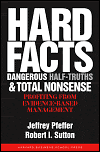I’ve been ploughing through a small hill of books recently, and its time to start posting the reviews. Unfortunately the quality ranges from not-so-great to absolutely horrible. This is unfortunate because i hate wasting my time, and because all of these authors have written other books I’ve found to be extremely good.

Hard Facts, Dangerous half-truths and total nonsense
by Robert Sutton and Jeffrey Pfeffer
Ironically this book far too frequently trades in exactly the kinds of half-truths and nonsense it rails against. Here’s an example:
We spent a lot of time trying to figure out why IDEO is so creative (p 85).
Rhetorically this is very clever. It makes the claim about IDEO being creative in the subordinate clause. This technique assumes the truth of its claim, and hopes to sneak it in under the radar, by subordinating it, so that readers are less likely to question its veracity. Is IDEO so creative? Well, I know they are extremely good at self-promotion. But are they really so creative? I haven’t seen any evidence. And for a book about evidence-based action, its ironic that the authors provide us absolutely no evidence beyond the rhetoric. In other words, its probably total nonsense. Thanks guys.
Later they claim that you shouldn’t worry too much about hiring good people, in part, because you really can’t tell the good from the bad anyway. As evidence, they offer up 3 quarter-backs whose careers started slow and improved. That’s a nice anecdote for football fans, but isn’t evidence of anything. They then go on to then say that studies have shown (beware, such phrases as “studies have shown”; they are the Welcome to Las Vegas neon-signs heralding total nonsense) that people’s performance varies day to day. This may or may not be true (they only provide scattered references to these studies), but again so what? So people’s performance varies? How does is this evidence that you needn’t worry about hiring good people?
Similarly Sutton and Pfeiffer warn us not to waste our time looking for natural talent, because natural talent doesn’t matter. Evidence: Tiger Woods practices relentlessly and that’s why he’s at the top of his game. No doubt his relentless practicing has helped put him on top. However, I’m willing to bet, if he stopped playing for a year, and I practiced every waking hour, he’d still be a way better golf player then I. He practices not to be in the top 10% or even top1% or even the top 10 pro golfer. He practices to be the #1 best golfer in the world.
What Sutton and Pfeiffer fail to admit is that looking for talented people, people who with work well in your culture and with your people, is not the same as trying to find the Tiger Woods of accounting. Not only is their evidence entirely anecdotal, but their whole argument about hiring good people is based on a series of subtle strawmen.
I stopped read by page 122; the book’s refreshing early chapter contrarianisms quickly became mired in half-truths and total nonsense and stayed there. So I’ll end with another example of IDEO and the tricky subordinate clause:
One of the main reason’s that IDEO’s system works so well is the attitude its people have toward knowledge (p 103).
Rhetorical trickery and an outright contradiction of earlier claims to boot! Either finding good people matters or it doesn’t guys—which way is it going to be? Unless of course people are blank slates to be written upon by the corporate culture that pays thier wages.
Well, I never lasted long enough to find out.